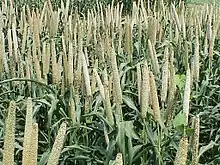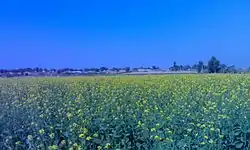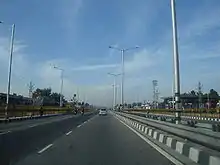Economy of Rajasthan
Rajasthan is a mineral-rich state and has a diversified economy having agriculture, mining and tourism as its main engines of growth. The state mines produce gold, silver, sandstone, limestone, marble, rock phosphate, copper and lignite. It is the second-largest producer of cement and contributes one tenth of the salt produced in India.[6]
 Jaipur, the capital and largest city of Rajasthan. | |
| Statistics | |
|---|---|
| Population | 68,548,437 (2011)[2] |
| GDP | ₹15.7 lakh crore (US$200 billion) (2023-24) |
| GDP rank | 8th |
GDP growth | 11.6% (2022-23)[3] |
GDP per capita | ₹166,560 (US$2,100) (2023-24) |
GDP per capita rank | 22nd |
GDP by sector | Agriculture 27% Industry 24% Services 41% (2021–22)[3] |
Population below poverty line | |
Labour force by occupation | Agriculture 44% Industry 8% Services 47% (2015)[3] |
| Unemployment | |
| Public finances | |
| 30.20% of GSDP (2023–24 est.)[3] | |
| ₹−58,212 crore (US$−7.3 billion) 4.4% of GSDP (2022–23 est.)[3] | |
| Revenues | ₹2.15 lakh crore (US$27 billion) (2022–23 est.)[3] |
| Expenses | ₹2.73 lakh crore (US$34 billion) (2022–23 est.)[3] |
All values, unless otherwise stated, are in US dollars. | |

Agriculture

Wheat[7] and barley are cultivated in large areas, as are pulses, sugarcane, and oilseeds. Cotton and tobacco are cash crops. Rajasthan is among the largest producers of edible oils in India and the second largest producer of oilseeds. Rajasthan is also the biggest wool-producing state in India. There are mainly two crop seasons Kharif and Rabi. The main source of irrigation is wells and tanks. The Indira Gandhi Canal irrigates northwestern Rajasthan.
Rajasthan is the largest producer of rapeseed, bajra, mustard and wool in India and the second largest producer of oilseeds and spices and milk. Rajasthan is third largest producer of soya bean and coarse cereals in India.[8]
Rajasthan is also the leading producer of milk in North India. Saras milk product brand of Rajasthan Co-operative Milk Producer Union has its outlets in Jodhpur(HQ), Jaipur and New Delhi.
Industries

Rajasthan is 12th leading investment destination in India after Maharashtra, Gujarat, Delhi, West Bengal, etc. because of its environment, law and order situation, infrastructure, investment climate and favourable population density. Areas facing NCR such as Bhiwadi are now popular with automobile and manufacturing companies. Many of the small scale suppliers and vendors have opted to shift inside Rajasthan border from Gurgaon in Haryana because of power shortage and infrastructure issues there.. But persistent law and order problem in far-away industrial belt is a growing cause of concern.
Rajasthan State Industrial Development and Investment Corporation provides facilities for development. Rajasthan is now the preferred destination for IT companies, & North India's largest integrated IT park is located in Jaipur and is named as Mahindra World City Jaipur covering nearly 3,000 acres (12 km2) of land. Some of the companies operating in Rajasthan include Infosys, Genpact, Wipro, Truworth, Deusche Bank, NEI, MICO, Honda Siel Cars, Coca-Cola, Gillete etc.
Mining
Rajasthan is pre-eminent in quarrying and mining in India. Hindustan Zinc, headquartered in Udaipur, Rajasthan is India's only and world's leading integrated zinc, lead and silver producer. With its large scale operations of smelting and mining in various districts of Rajasthan, the company has contributed to the socio-economic development of the state. The state is the largest source of cement. Rajasthan is the largest cement-producing state of India. It has rich salt deposits at Sambhar, copper mines at Khetri and zinc mines at Dariba and Zawar. This is a chart of output of major minerals of Rajasthan.
| Mineral | National Share |
|---|---|
| Wollastonite | 100% |
| Jasper | 100% |
| Zinc concentrate | 99% |
| Fluorite | 96% |
| Gypsum | 93% |
| Marble | 92% |
| Asbestos | 89% |
| Soapstone | 87% |
| Lead concentrate | 80% |
| Phosphate rock | 75% |
| Ball clay | 71% |
| Calcite | 70% |
| Sandstone | 70% |
| Flaggy limestone | 70% |
| Feldspar | 70% |
Tourism
Tourism is flourishing in Rajasthan. The palaces of Jaipur, lakes of Udaipur, and desert forts of Jodhpur, Bikaner & Jaisalmer are among the most common destinations for tourists. Tourism accounts for sixteen percent [9] of the state's domestic product. Many old and neglected palaces and forts have been converted into heritage hotels. Tourism has increased employment in the hospitality sector.
Handicrafts
A spin-off of tourism has been the growth of the handicrafts industry. Bassi and Molella villages in Chittorgarh and Rajasamand are well known for their wooden and clay handicraft items respectively. Blue pottery of Jaipur and ustta Kalan of Bikaner are also famous around the globe. Jodhpur is one of the major handicraft hubs in India, trading its handicrafts globally.
References
- "Population Projection 2019" (PDF).
- "Census 2011" (PDF).
- "Rajasthan Budget Analysis 2022-23". PRS Legislative Research. Retrieved 12 March 2022.
- "SDGs India Index". NITI Aayog. 31 December 2019.
- "Unemployment Rate in India". Centre for Monitoring Indian Economy. p. 1. Retrieved 3 November 2020.
- "Economy of Rajasthan". Mapsofindia.com. Retrieved 7 August 2016.
- "Rajasthan tops in wheat production - Times of India". Timesofindia.indiatimes.com. 20 March 2016. Retrieved 7 August 2016.
- "Macro overview of Economy of Rajasthan". Just Wiki. 11 July 2016. Archived from the original on 18 August 2016. Retrieved 7 August 2016.
- "Rajasthan Economy". business.mapsofindia.com. Retrieved 10 January 2017.
